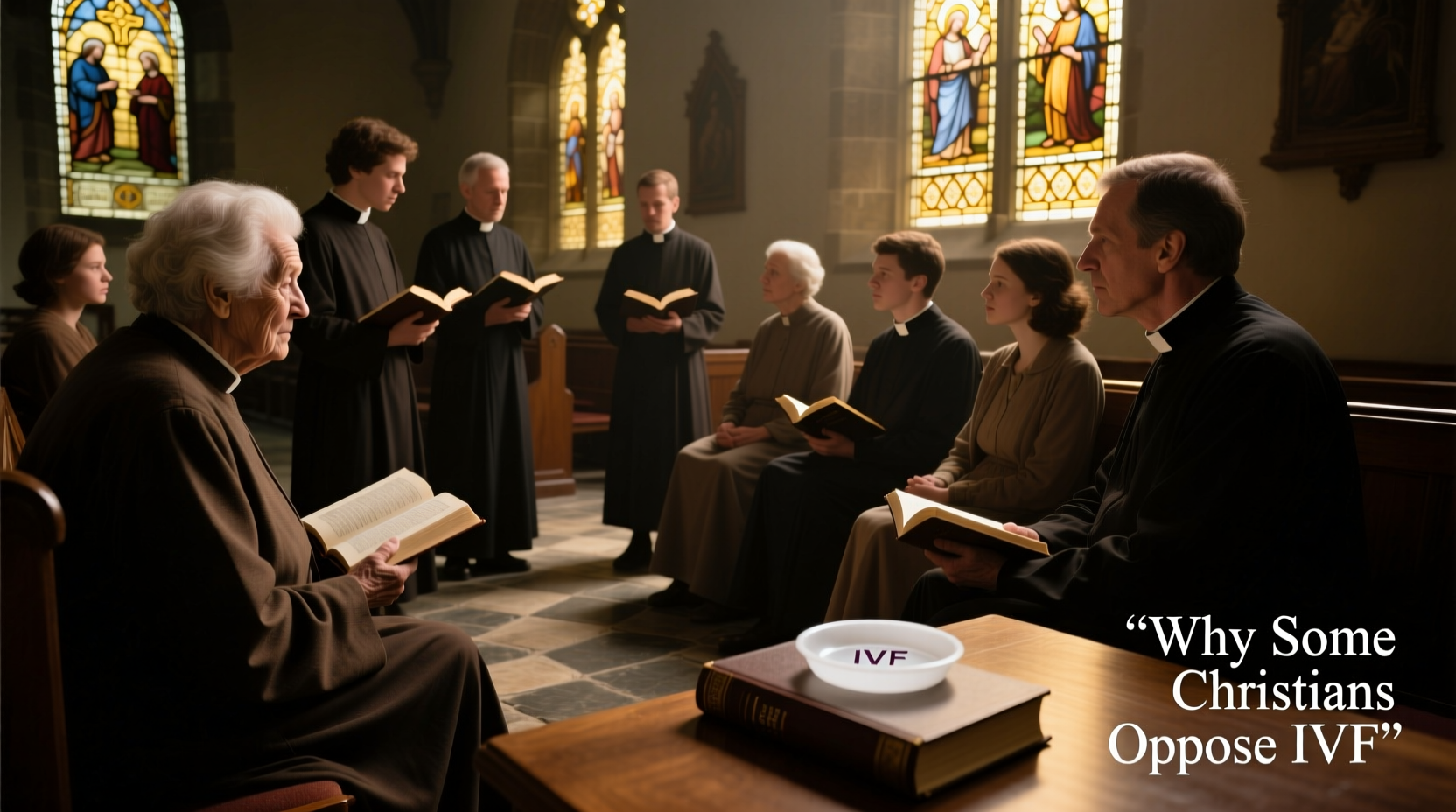In recent decades, in vitro fertilization (IVF) has become a widely accepted medical solution for couples facing infertility. Since the birth of Louise Brown in 1978—the first baby conceived through IVF—over eight million children have been born using this technology. While many Christian couples have embraced IVF as a gift of modern medicine, others remain deeply cautious or outright opposed. Their reservations are not rooted in ignorance or fear of science, but in serious theological, moral, and scriptural considerations. Understanding these concerns requires more than a surface-level critique—it demands an exploration of what it means to honor life, marriage, and divine sovereignty from a Christian worldview.
Theological Foundations Behind Christian Concerns

At the heart of Christian opposition to IVF lies a profound reverence for human life and the sanctity of natural procreation within marriage. Many conservative Christians believe that conception should occur through the intimate union of husband and wife, as described in Genesis: “Therefore a man shall leave his father and his mother and hold fast to his wife, and they shall become one flesh” (Genesis 2:24). This “one flesh” principle is seen not merely as emotional or spiritual unity, but as a physical joining in which God sovereignly grants the gift of life.
When conception occurs outside the body—particularly in a laboratory setting—some Christians view this as a disruption of God’s ordained process. The deliberate manipulation of embryos, the potential destruction of unused ones, and the separation of procreation from marital intimacy raise significant ethical red flags. For these believers, reproduction is not simply a biological function to be technologically assisted, but a sacred act entrusted by God.
“We must never forget that every human life begins with the breath of God, not the pipette of a scientist.” — Dr. Paul Williams, Bioethicist and Theologian
Moral and Ethical Dilemmas in IVF Procedures
One of the most consistent objections among Christian critics of IVF centers on the fate of embryos. During a typical IVF cycle, multiple eggs are fertilized to increase the chances of successful implantation. However, only one or two embryos are usually transferred to the uterus. The remaining embryos are either frozen indefinitely, donated to research, used for stem cell experimentation, or discarded.
To many Christians, each embryo represents a unique human life created in the image of God (Imago Dei). The intentional creation of embryos with the knowledge that some will not be implanted—and may be destroyed—is morally equivalent to taking innocent life. This concern is amplified when clinics engage in practices such as selective reduction (intentionally terminating one or more fetuses in a multiple pregnancy) or preimplantation genetic diagnosis (PGD), which allows parents to select embryos based on traits like sex or genetic conditions.
A Comparison of Common IVF Practices and Christian Values
| IVF Practice | Common Medical Purpose | Potential Conflict with Christian Beliefs |
|---|---|---|
| Multiple Embryo Creation | Increase success rate | Leads to surplus embryos, often discarded or frozen |
| Embryo Freezing | Preserve for future use | Raises questions about the dignity of suspended human life |
| Preimplantation Genetic Diagnosis (PGD) | Screen for genetic disorders | May lead to selection or discarding of embryos based on traits |
| Donor Eggs or Sperm | Used when one partner is infertile | Introduces third-party genetics, complicating marital unity |
| Surrogacy | For women unable to carry a pregnancy | Separates motherhood from gestation; raises identity and kinship issues |
Different Christian Denominations, Different Views
It's important to recognize that Christianity is not monolithic in its stance on IVF. Views vary significantly across denominations and theological traditions.
- Roman Catholic Church: Officially opposes IVF in all forms. The Catechism states that techniques involving “the dissociation of husband and wife” in procreation violate the dignity of marriage and the right of every person to be conceived in marital love.
- Eastern Orthodox Churches: Generally share similar concerns with Catholics, emphasizing the sanctity of natural conception and rejecting embryo destruction.
- Many Protestant Evangelicals: Hold diverse views. Some accept IVF if it uses only the married couple’s gametes and avoids embryo destruction. Others reject it entirely due to ethical concerns.
- Some Mainline Protestants: Tend to support reproductive technologies as acts of compassion and healing, provided they are used responsibly.
This spectrum reflects broader tensions within Christianity between upholding traditional teachings on life and marriage, and embracing medical advances that alleviate suffering.
A Real-Life Scenario: The Thompson Family
Mark and Sarah Thompson, a devout Baptist couple in their mid-thirties, struggled with unexplained infertility for five years. After exhausting natural treatments, their doctor recommended IVF. Excited yet anxious, they sought counsel from their pastor. He raised concerns about creating multiple embryos and the risk of discarding them. Deeply conflicted, the couple visited a Christian bioethics center where they learned about “single embryo transfer” protocols and clinics that minimize embryo overproduction.
They ultimately chose a clinic aligned with their values, limiting fertilization to three embryos and committing to adopt any remaining viable ones through a Christian embryo adoption program. Their journey wasn’t easy, but it was guided by prayer, community input, and a desire to honor God in every decision.
Practical Guidance for Christian Couples Considering IVF
For Christians navigating infertility, the path forward is rarely simple. Medical, emotional, and spiritual dimensions intersect in deeply personal ways. Below is a checklist to help couples make informed, faith-centered decisions.
- Evaluate your motivations: Are you seeking to build a family within God’s design, or trying to control outcomes at any cost?
- Consult spiritual leaders: Speak with pastors, elders, or theologians familiar with bioethics.
- Research clinic practices: Ask how many embryos they typically create, how they handle surplus, and whether they offer single embryo transfer options.
- Consider alternatives: Explore adoption, foster care, or child-free ministry as valid expressions of vocation.
- Pray consistently: Seek wisdom from James 1:5—“If any of you lacks wisdom, let him ask God, who gives generously.”
Frequently Asked Questions
Is IVF always wrong according to Christianity?
No, not all Christian traditions consider IVF inherently sinful. The Roman Catholic Church prohibits it, but many Protestant denominations permit it under certain conditions—especially when it involves only the married couple’s genetic material and avoids embryo destruction.
What about using donor sperm or eggs? Is that acceptable?
Most conservative Christian ethicists oppose third-party donation because it introduces another person into the procreative act, which they believe should remain exclusive to the married couple. It can also complicate issues of identity, lineage, and parental responsibility.
Can frozen embryos be adopted?
Yes—embryo adoption is supported by some Christian organizations as a way to give surplus embryos a chance at life. Programs like Nightlight Christian Adoptions offer “Snowflakes” embryo adoption, allowing couples to implant frozen embryos from other IVF cycles.
Conclusion: Honoring Life, Marriage, and Divine Sovereignty
The debate over IVF among Christians is not a rejection of science, but a call to integrate medical innovation with moral integrity. While infertility is a painful trial, the solution must not compromise core beliefs about the sanctity of life, the covenant of marriage, and God’s role as the giver of children.
Couples facing these decisions deserve compassion, not judgment. They also need truthful guidance that respects both their longing for children and their commitment to faith. Whether choosing to pursue IVF under strict ethical boundaries, exploring adoption, or accepting childlessness as part of their story, every path should be walked in prayerful dependence on God.









 浙公网安备
33010002000092号
浙公网安备
33010002000092号 浙B2-20120091-4
浙B2-20120091-4
Comments
No comments yet. Why don't you start the discussion?